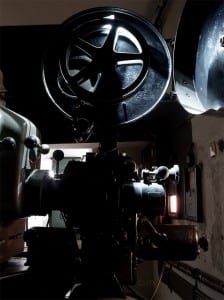This is Where We Came in: Memories of 60s Cinema-Going
By zclef78, on 10 June 2014
 An acre of seats in the garden of dreams.
An acre of seats in the garden of dreams.
Trips to the big screen are often some of our fondest childhood memories. So it was no surprise that the first UCL Festival of the Arts film event was a popular one as we spent a nostalgic hour reconstructing the space of 1960s cinema in Britain through the memories of cinema-goers.
The tiered flip down chairs of the Sir Ambrose Fleming Lecture Theatre and slideshow of iconic cinematic moments—Sean Connery and Shirley Eaton in Goldfinger, Marilyn Monroe, Breakfast at Tiffanys—set the scene for Dr Melvyn Stokes and Dr Matthew Jones (UCL History) to talk about the findings of their research project, which explores how cinema shaped the collective experience of during a period of turbulent social change.
Their research opens up questions about our notions of the relationships between memory, experience and space, as well as questioning received narratives of the 1960s decade.
Dr Henry K. Miller (film historian and critic) complemented their talk with a discussion of his research into the history of the first university film department to open in the 60s at UCL Slade School of Fine Art.
 Close
Close




